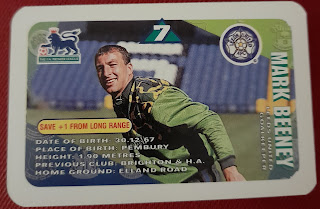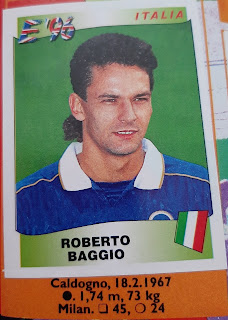N/A: Mark Beeney, Leeds United, Subbuteo Squads Premier League Pro Edition
Back in January the impoverished La Liga giants Barcelona scraped together just enough from the collective piggy banks of their owners to bring Spanish international and former Manchester City forward Ferran Torres to Camp Nou for a measly €55m. Quite how a club that posted losses of £440m at the end of the 2020/21 campaign and attempted to save their backsides through the introduction of the risible European Super League was able to stump up such an exorbitant fee for someone who has so far scored 27 goals in his 155 professional appearances might make little sense on the surface. However, it transpires that by convincing French defender Samuel Umiti to sign a contract extension with a wage decrease and palming Phillippe Coutinho off on to Steven Gerrard’s Aston Villa magically freed up the necessary cash to convince the number crunchers at UEFA’s Financial Fair Play committee that this was legitimate.
When any business begins to struggle the first casualties are staff and football is no different. Back in 2010 when Crystal Palace were plunged into administration prized asset Victor Moses was hastily sold to Wigan Athletic for £2.5m to keep the wolves from the door. For clubs outside of the self-anointed ‘Top Six’ the dangers of financial peril are never far away and clubs of the magnitude of Leicester City, Bradford City, Leeds United and Derby County have suffered similar fates in the last twenty years. Despite now enjoying the riches of the Premier League, and picking up a cool £13m for defender Dan Burn from Newcastle United at the end of January, Brighton and Hove Albion fans know only too well the impact of charlatan owners and financial mismanagement. Between 1997 and 2011 the Seagulls were without a home following the sale of the Goldstone Ground and found themselves ground sharing seventy miles away in Gillingham before obtaining a lease to play on the council owned Withdean Stadium which had started out life as an athletics track. This should be the time for a cheap dig about the atmosphere at the Amex but that kind of goes against the nature of this article.
The Seagulls were first served with a winding up order to the tune of £380,000 in November 1992 and, although they received a stay of execution until February of the following year, the club faced liquidation in April 1993. With the threat of the entire first team squad becoming free agents at the end of the month it came as something of a surprise when former Brighton winger Howard Wilkinson, then manager of defending Football League champions Leeds United, came in with an offer of £350,000 for the Seagulls’ first choice goalkeeper Mark Beeney. In the space of two days he was on his way north to serves as back up to John Lukic and Brighton were on their way to HMRC to settle their initial debt. Although the club would face more hardships in the years to come it’s fair to say that this generous deal kept them afloat.
Mark Beeney was undoubtedly a solid goalkeeper and had impressed for both Maidstone United and Brighton in the formative years of his career. Whether or not he was qualified for the rapid promotion to the Premier League is up for debate but with the imminent retirement of Mervyn Day and John Lukic well into his thirties Leeds were looking to strengthen their squad. He made his debut on the last day of the 1992/93 season but shipped three goals in an entertaining draw with Coventry City. Beeney was called upon just four games into the following campaign following a 4-0 loss to Norwich City but was unable to help Leeds avoid further defeat to Arsenal and made just six league appearances as the side finished fifth in the Premier League. After spending the 1994/95 season on the bench he enjoyed his longest run in the side during the 1995/96 campaign where he made ten appearances including the highs of a Christmas Eve 3-1 win against eventual champions Manchester United, with goals from Tony Yeboah, Brian Deane and Gary McAllister, and the lows of a 5-0 defeat to Liverpool which more or less ended Tomas Brolin’s short stay at Elland Road.
John Lukic returned to Arsenal ahead of the 1996/97 season but the arrival of Nigel Martyn from Crystal Palace limited Beeney to a solitary league appearance albeit one in which he kept just his third clean sheet for Leeds. After six years and just 35 league appearances Mark Beeney parted company with the club in 1999 on good terms having made little fuss about his role as a substitute keeper and having turned out over 400 times for the reserves. After short spells at Doncaster Rovers, Dover Athletic and Sittingbourne he retired in 2003 and entered the world of goalkeeping coaching with Chelsea’s reserve and academy prospects. After Jose Mourinho’s first departure from Stamford Bridge in 2007 he briefly served as the club’s first team goalkeeping coach before returning to the academy where he later worked with his sons Jordan and Mitchell.
During the most recent January transfer window Premier League clubs spent a total of £295m on new talent with over half of that being spent by the bottom five clubs in a desperate attempt to avoid relegation. Back over in Spain our poor friends in Barcelona magically found the funds to pay incoming stars Adama Traore and Pierre-Emerick Aubameyang impressive wages. It’s a far cry from the days where the departure of a goalkeeper was enough to save a club from vanishing into financial oblivion. Whether or not those clubs further down the ladder from the lofty heights of Europe’s self-appointed elite will be afforded such privileges in the coming months is impossible to say but it’s doubtful that them flogging their prize assets will allow them to pick up some international stars in return.





Comments
Post a Comment